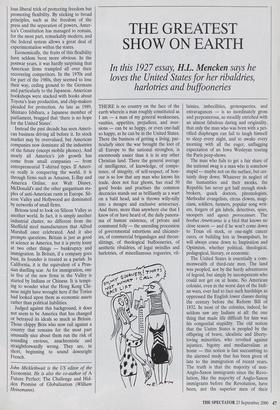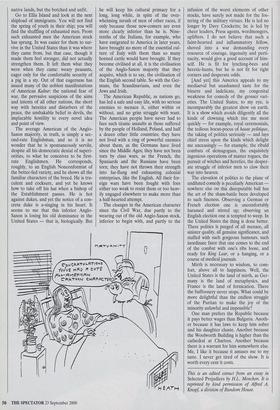THE GREATEST SHOW ON EARTH
loves the United States for her ribaldries, harlotries and buffooneries
THERE is no country on the face of the earth wherein a man roughly constituted as I am — a man of my general weaknesses, vanities, appetites, prejudices, and aver- sions — can be so happy, or even one-half so happy, as he can be in the United States. There the business of getting a living, par- ticularly since the war brought the loot of all Europe to the national strongbox, is enormously easier than it is in any other Christian land. There the general average of intelligence, of knowledge, of compe- tence, of integrity, of self-respect, of hon- our is so low that any man who knows his trade, does not fear ghosts, has read 50 good books and practises the common decencies stands out as brilliantly as a wart on a bald head, and is thrown willy-nilly into a meagre and exclusive aristocracy. And there, more than anywhere else that I know of or have heard of, the daily panora- ma of human existence, of private and communal folly — the unending procession of governmental extortions and chicaner- ies, of commercial brigandages and throat- slittings, of theological buffooneries, of aesthetic ribaldries, of legal swindles and harlotries, of miscellaneous rogueries, vil- lainies, imbecilities, grotesqueries, and extravagances — is so inordinately gross and preposterous, so steadily enriched with an almost fabulous daring and originality, that only the man who was born with a pet- rified diaphragm can fail to laugh himself to sleep every night, and to awake every morning with all the eager, unflagging expectation of an Iowa Wesleyan touring the Paris peep-shows.
The man who fails to get a fair share of the national swag is a man who is somehow stupid — maybe not on the surface, but cer- tainly deep down. Whatever its neglect of the humanities and their monks, the Republic has never got half enough stock- brokers, quack doctors, phrenologists, Methodist evangelists, circus clowns, magi- cians, soldiers, farmers, popular song writ- ers, forgers of gin labels, detectives, spies, snoopers and agents provocateurs. The boobus Americanus is a bird that knows no close season — and if he won't come down to Texas oil stock, or one-night cancer cures, or building lots in Swampshurt, he will always come down to Inspiration and Optimism, whether political, theological, pedagogical, literary, or economic.
The United States is essentially a com- monwealth of third-rate men. The land was peopled, not by the hardy adventurers of legend, but simply by incompetents who could not get on at home. No American colonist, even in the worst days of the Indi- an wars, ever had to face such hardships as oppressed the English lower classes during the century before the Reform Bill of 1832. In most of the colonies, indeed, he seldom saw any Indians at all: the one thing that made life difficult for him was his congenital stupidity. The old notion that the Unites States is peopled by the offspring of brave, idealistic and liberty- loving minorities, who revolted against injustice, bigotry and mediaevalism at home — this notion is fast succumbing to the alarmed study that has been given of late to the immigration of recent years. The truth is that the majority of non- Anglo-Saxon immigrants since the Revo- lution, like the majority of Anglo-Saxon immigrants before the Revolution, have been, not the superior men of their native lands, but the botched and unfit.
Go to Ellis Island and look at the next shipload of immigrants. You will not find the spring of youth in their ship; you will find the shuffling of exhausted men. From such exhausted men the American stock has sprung. In was easier for them to sur- vive in the United States than it was where they came from, but that case, though it made them feel stronger, did not actually strengthen them. It left them what they were when they came: weary peasants, eager only for the comfortable security of a pig in a sty. Out of that eagerness has issued many of the noblest manifestations of American Kultur the national fear of war, the pervasive suspicions of the aims and intents of all other nations, the short way with heretics and disturbers of the peace, the unshakable belief in devils, the implacable hostility to every novel idea and point of view, The average American of the Anglo- Saxon majority, in truth, is simply a sec- ond-rate Englishman, and so it is no wonder that he is spontaneously servile, despite all his democratic denial of superi- orities, to what he conceives to be first- rate Englishmen. He corresponds, roughly, to an English Nonconformist of the better-fed variety, and he shows all the familiar characters of the breed. He is tru- culent and cocksure, and yet he knows how to take off his hat when a bishop of the Establishment passes. He is hot against dukes, and yet the notice of a con- crete duke is a-singing in his heart. It seems to me that this inferior Anglo- Saxon is losing his old dominance in the United States — that is, biologically. But he will keep his cultural primacy for a long, long while, in spite of the over- whelming inrush of men of other races, if only because those new-comers are even more clearly inferior than he is. Nine- tenths of the Italians, for example, who have emigrated to America in later years, have brought no more of the essential cul- ture of Italy with them than so many horned cattle would have brought. If they become civilised at all, it is the civilisation of the Anglo-Saxon majority that they acquire, which is to say, the civilisation of the English second table, So with the Ger- mans, the Scandinavians, and even the Jews and Irish.
The American Republic, as nations go, has led a safe and easy life, with no serious enemies to menace it, either within or without, and no grim struggle with want. The American people have never had to face such titanic assaults as those suffered by the people of Holland, Poland, and half a dozen other little countries; they have not lived with a ring of powerful enemies about them, as the Germans have lived since the Middle Ages; they have not been torn by class wars, as the French, the Spaniards and the Russians have been torn; they have not thrown their strength into far-flung and exhausting colonial enterprises, like the English. All their for- eign wars have been fought with foes either too weak to resist them or too heav- ily engaged elsewhere to make more than a half-hearted attempt.
The changes in the American character since the Civil War, due partly to the wearing out of the old Anglo-Saxon stock, inferior to begin with, and partly to the infusion of the worst elements of other stocks, have surely not made for the fos- tering of the military virtues. He is led no longer by Davy Crocketts; he is led by cheer leaders, Press agents, wordmongers, uplifters. I do not believe that such a faint-hearted and inflammatory fellow, shoved into a war demanding every resource of courage, ingenuity and perti- nacity, would give a good account of him- self. He is fit for lynching-bees and heretic-hunts, but he is not fit for tight corners and desperate odds.
[And yet] this America appeals to my mediaeval but unashamed taste for the bizarre and indelicate, my congenital weakness for comedy of the grosser vari- eties. The United States, to my eye, is incomparably the greatest show on earth. It is a show which avoids diligently all the kinds of clowning which tire me most quickly — for example, royal ceremonials, the tedious hocus-pocus of haute politique, the taking of politics seriously — and lays chief stress upon the kinds which delight me unceasingly — for example, the ribald combats of demagogues, the exquisitely ingenious operations of master rogues, the pursuit of witches and heretics, the desper- ate struggle of inferior men to claw their way into heaven.
The elevation of politics to the plane of undiluted comedy is peculiarly American — nowhere else on this disreputable ball has the art of the sham-battle been developed to such fineness. Observing a German or French election one is uncomfortably harassed and stirred up; observing an English election one is tempted to weep. In the United States the thing is done better. There politics is purged of all menace, all sinister quality, all genuine significance, and stuffed with such gorgeous humours, such inordinate farce that one comes to the end of the combat with one's ribs loose, and ready for King Lear, or a hanging, or a course of medical journals.
Mirth is necessary to wisdom, to com- fort, above all to happiness. Well, the United States is the land of mirth, as Ger- many is the land of metaphysics, and France is the land of fornication. There the buffoonery never stops. What could be more delightful than the endless struggle of the Puritan to make the joy of the minority unlawful and impossible?
One man prefers the Republic because it pays better wages than Bulgaria. Anoth- er because it has laws to keep him sober and his daughter chaste. Another because the Woolworth Building is higher than the cathedral at Chartres. Another because there is a warrant for him somewhere else. Me, I like it because it amuses me to my taste. I never get tired of the show, It is worth every cent it costs.
This is an edited extract from an essay in Selected Prejudices by H.L. Mencken. It is reprinted by kind permission of Alfred A. Knopf a division of Random House.























































































 Previous page
Previous page